江苏省启东中学高一英语上学期复习讲义:动词时态语态一
- 格式:doc
- 大小:164.00 KB
- 文档页数:10
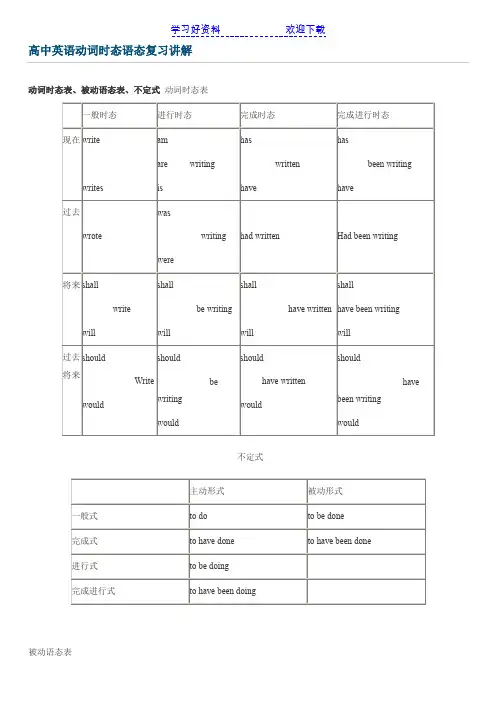
动词时态表、被动语态表、不定式动词时态表不定式被动语态表动词的时态语态1.一个长动作作为背景,被一个短动作打断,长动作往往用进行体,短动作用一般体。
Tom slipped into the house when no one was looking.As he was reading the newspaper, granny fell asleep.2. 表示动作的未完性,暂时性。
I don’t really work here. I am just helping out until the new secretary arrives.Selecting a mobile phone for a personal use is no easy task because technology is changing so rapidly.3. 表示现在或当时发展中或正在进行的情况。
I don’t think Jim saw me; he was just staring into space.I first met Lisa 3 years ago. She was working at a radio shop at that time.动词时态、语态汉语的时态大多是通过副词来表达的,而英语的时态是靠动词的变化和时间状语来表达的。
英语中的时态共有十六种,但是常考的或较常用的只有9种,而且重点测试完成时态。
要掌握英语的时态和语态,必须掌握好英语中的助动词(do, be, have)和时间状语这两个核心问题。
一、一般过去时和现在完成时的用法区别1.一般过去时所表示的一个或一段过去时间是可以具体确定的,与其他时间没有牵连。
它所表示的事情纯属过去与现在情况没有联系。
现在完成时表示的事情发生在不能具体指出的现在以前的过去产某个或某段时间。
它所表示的事情与现在情况有关系,是过去事情在现在产生的结果或对现在的影响。
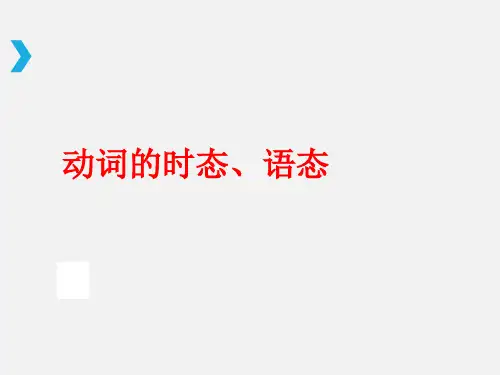
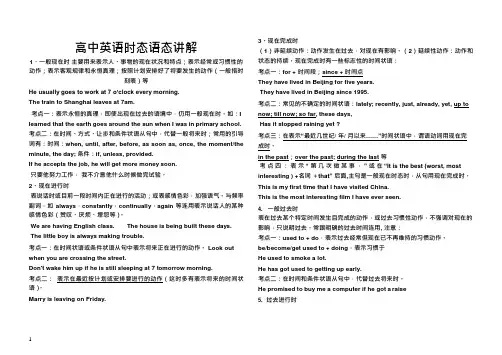
高中英语时态语态讲解1、一般现在时主要用来表示人、事物的现在状况和特点;表示经常或习惯性的动作;表示客观规律和永恒真理;按照计划安排好了将要发生的动作(一般指时刻表)等He usually goes to work at 7 o’clock every morning.The train to Shanghai leaves at 7am.考点一:表示永恒的真理,即使出现在过去的语境中,仍用一般现在时。
如:I learned that the earth goes around the sun when I was in primary school. 考点二:在时间、方式、让步和条件状语从句中,代替一般将来时;常用的引导词有:时间:when, until, after, before, as soon as, once, the moment/the minute, the day; 条件:if, unless, provided.If he accepts the job, he will get more money soon.只要他努力工作,我不介意他什么时候做完试验。
2、现在进行时表说话时或目前一段时间内正在进行的活动;或表感情色彩,加强语气。
与频率副词,如always,constantly,continually,again 等连用表示说话人的某种感情色彩(赞叹、厌烦、埋怨等)。
We are having English class. The house is being built these days. The little boy is always making trouble.考点一:在时间状语或条件状语从句中表示将来正在进行的动作。
Look out when you are crossing the street.Don't wake him up if he is still sleeping at 7 tomorrow morning.考点二:表示在最近按计划或安排要进行的动作(这时多有表示将来的时间状语)。
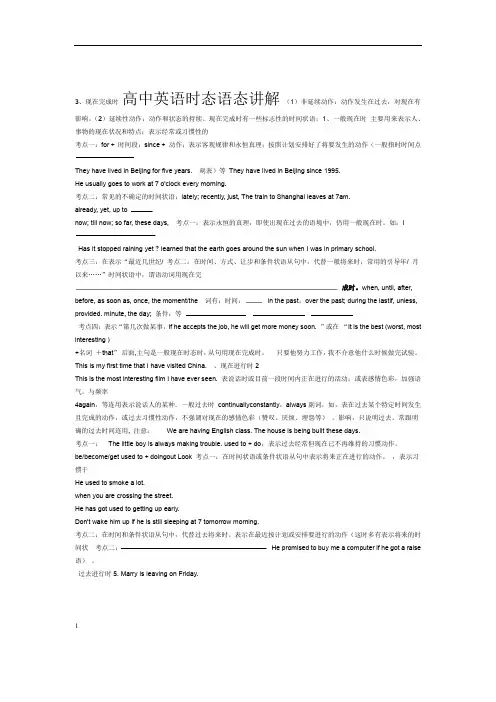
3、现在完成时高中英语时态语态讲解(1)非延续动作:动作发生在过去,对现在有影响。
(2)延续性动作:动作和状态的持续。
现在完成时有一些标志性的时间状语:1、一般现在时主要用来表示人、事物的现在状况和特点;表示经常或习惯性的考点一:for + 时间段;since + 动作;表示客观规律和永恒真理;按照计划安排好了将要发生的动作(一般指时时间点They have lived in Beijing for five years. 刻表)等They have lived in Beijing since 1995.He usually goes to work at 7 o'clock every morning.考点二:常见的不确定的时间状语:lately; recently, just, The train to Shanghai leaves at 7am.already, yet, up tonow; till now; so far, these days, 考点一:表示永恒的真理,即使出现在过去的语境中,仍用一般现在时。
如:IHas it stopped raining yet ? learned that the earth goes around the sun when I was in primary school.考点三:在表示“最近几世纪/ 考点二:在时间、方式、让步和条件状语从句中,代替一般将来时;常用的引导年/ 月以来……”时间状语中,谓语动词用现在完成时。
when, until, after, before, as soon as, once, the moment/the 词有:时间:in the past;over the past; during the lastif, unless, provided. minute, the day; 条件:等考点四:表示“第几次做某事,If he accepts the job, he will get more money soon. ”或在“It is the best (worst, most interesting )+名词+that”后面,主句是一般现在时态时,从句用现在完成时。
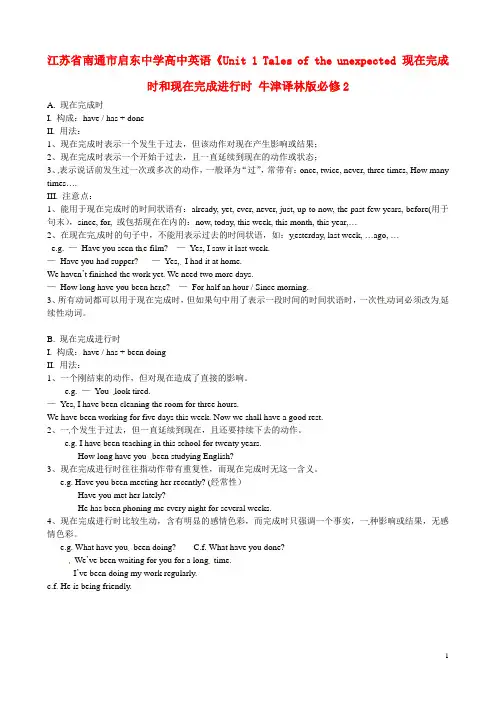
江苏省南通市启东中学高中英语《Unit 1 Tales of the unexpected 现在完成时和现在完成进行时牛津译林版必修2A. 现在完成时I. 构成:have / has + doneII. 用法:1、现在完成时表示一个发生于过去,但该动作对现在产生影响或结果;2、现在完成时表示一个开始于过去,且一直延续到现在的动作或状态;3、表示说话前发生过一次或多次的动作,一般译为“过”,常带有:once, twice, never, three times, How many times….III. 注意点:1、能用于现在完成时的时间状语有:already, yet, ever, never, just, up to now, the past few years, before(用于句末),since, for, 或包括现在在内的:now, today, this week, this month, this year,…2、在现在完成时的句子中,不能用表示过去的时间状语,如:yesterday, last week, …ago, …e.g. —Have you seen th e film? —Yes, I saw it last week.—Have you had supper? —Yes,I had it at home.We haven’t finished the work yet. We need two more days.—How long have you been her e? —For half an hour / Since morning.3、所有动词都可以用于现在完成时,但如果句中用了表示一段时间的时间状语时,一次性动词必须改为延续性动词。
B. 现在完成进行时I. 构成:have / has + been doingII. 用法:1、一个刚结束的动作,但对现在造成了直接的影响。

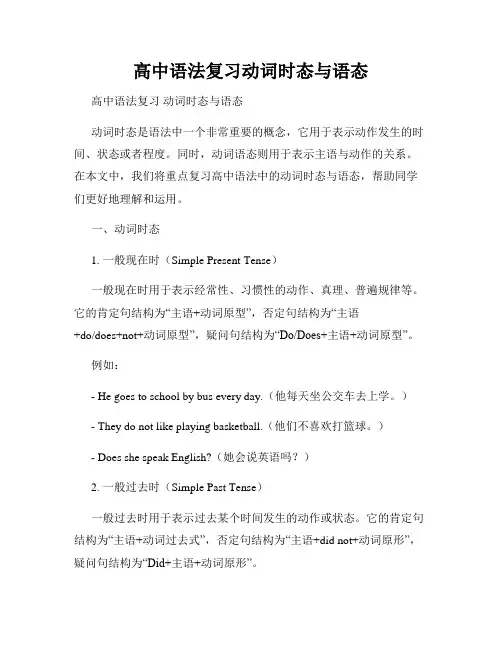
高中语法复习动词时态与语态高中语法复习动词时态与语态动词时态是语法中一个非常重要的概念,它用于表示动作发生的时间、状态或者程度。
同时,动词语态则用于表示主语与动作的关系。
在本文中,我们将重点复习高中语法中的动词时态与语态,帮助同学们更好地理解和运用。
一、动词时态1. 一般现在时(Simple Present Tense)一般现在时用于表示经常性、习惯性的动作、真理、普遍规律等。
它的肯定句结构为“主语+动词原型”,否定句结构为“主语+do/does+not+动词原型”,疑问句结构为“Do/Does+主语+动词原型”。
例如:- He goes to school by bus every day.(他每天坐公交车去上学。
)- They do not like playing basketball.(他们不喜欢打篮球。
)- Does she speak English?(她会说英语吗?)2. 一般过去时(Simple Past Tense)一般过去时用于表示过去某个时间发生的动作或状态。
它的肯定句结构为“主语+动词过去式”,否定句结构为“主语+did not+动词原形”,疑问句结构为“Did+主语+动词原形”。
例如:- I watched a movie last night.(昨晚我看了一场电影。
)- They did not go to the party.(他们没有参加派对。
)- Did you finish your homework?(你完成作业了吗?)3. 一般将来时(Simple Future Tense)一般将来时用于表示将来某个时间会发生的动作或状态。
它的肯定句结构为“主语+will+动词原形”,否定句结构为“主语+will not+动词原形”,疑问句结构为“Will+主语+动词原形”。
例如:- She will go to Beijing next week.(她下周将去北京。
)- We will not have a meeting tomorrow.(明天我们不开会。
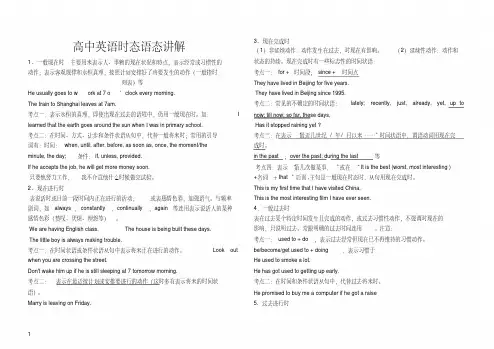
高中英语时态语态讲解1、一般现在时主要用来表示人、事物的现在状况和特点;表示经常或习惯性的动作;表示客观规律和永恒真理;按照计划安排好了将要发生的动作(一般指时刻表)等He usually goes to w ork at 7 o’clock every morning.The train to Shanghai leaves at 7am.考点一:表示永恒的真理,即使出现在过去的语境中,仍用一般现在时。
如:I learned that the earth goes around the sun when I was in primary school.考点二:在时间、方式、让步和条件状语从句中,代替一般将来时;常用的引导词有:时间:when, until, after, before, as soon as, once, the moment/theminute, the day; 条件:if, unless, provided.If he accepts the job, he will get more money soon.只要他努力工作,我不介意他什么时候做完试验。
2、现在进行时表说话时或目前一段时间内正在进行的活动;或表感情色彩,加强语气。
与频率副词,如always,constantly,continually,again等连用表示说话人的某种感情色彩(赞叹、厌烦、埋怨等)。
We are having English class. The house is being built these days.The little boy is always making trouble.考点一:在时间状语或条件状语从句中表示将来正在进行的动作。
Look out when you are crossing the street.Don't wake him up if he is still sleeping at 7 tomorrow morning.考点二:表示在最近按计划或安排要进行的动作(这时多有表示将来的时间状语)。
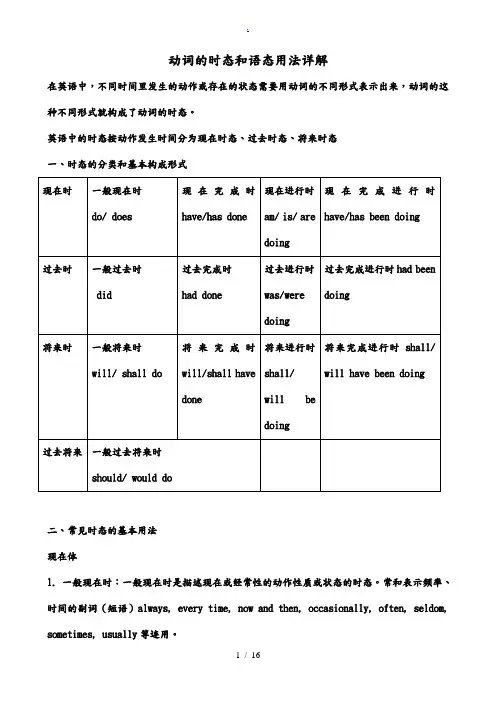
动词的时态和语态用法详解在英语中,不同时间里发生的动作或存在的状态需要用动词的不同形式表示出来,动词的这种不同形式就构成了动词的时态。
英语中的时态按动作发生时间分为现在时态、过去时态、将来时态一、时态的分类和基本构成形式二、常见时态的基本用法现在体1. 一般现在时:一般现在时是描述现在或经常性的动作性质或状态的时态。
常和表示频率、时间的副词(短语)always, every time, now and then, occasionally, often, seldom, sometimes, usually等连用。
1)表示经常性或习惯性的动作。
We have three meals a day.2)表示客观事实、真理和自然现象。
Knowledge is power.3)表示现在的情况或状态。
I live in Beijing.4)表示已经“列入日程”的将来的事件,尤其指计划中的和安排好的将来的动作,这些动词往往表示“出发,到达”等含义的词,如,arrive, begin, go, leave, start, stay等。
The train arrives at 10:30. There's plenty of time. 。
考点一:表示永恒的真理,即使出现在过去的语境中,仍用一般现在时。
如:I learned that the earth goes around the sun when I was in primary school.考点二:在时间和条件状语从句中,代替一般将来时;常用的引导词有:时间:when, until, after, before, as soon as, once, the moment/the minute, the day; 条件:if, unless, provided.If he accepts the job, he will get more money soon.考点三:在make sure (certain), see to it, mind, care, matter +宾语从句,从句用一般现在时代替一般将来时。
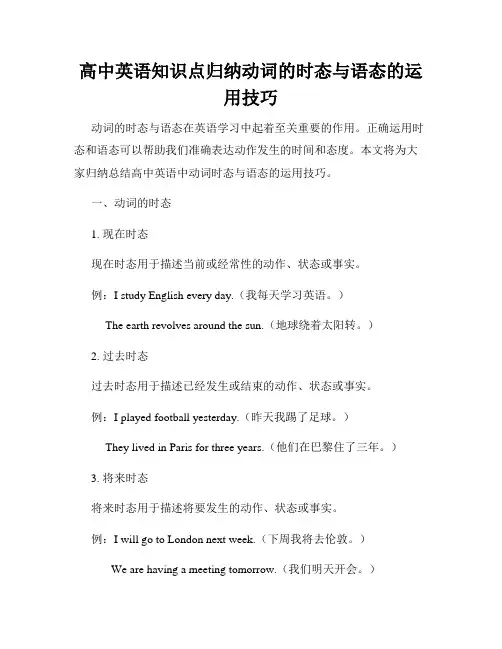
高中英语知识点归纳动词的时态与语态的运用技巧动词的时态与语态在英语学习中起着至关重要的作用。
正确运用时态和语态可以帮助我们准确表达动作发生的时间和态度。
本文将为大家归纳总结高中英语中动词时态与语态的运用技巧。
一、动词的时态1. 现在时态现在时态用于描述当前或经常性的动作、状态或事实。
例:I study English every day.(我每天学习英语。
)The earth revolves around the sun.(地球绕着太阳转。
)2. 过去时态过去时态用于描述已经发生或结束的动作、状态或事实。
例:I played football yesterday.(昨天我踢了足球。
)They lived in Paris for three years.(他们在巴黎住了三年。
)3. 将来时态将来时态用于描述将要发生的动作、状态或事实。
例:I will go to London next week.(下周我将去伦敦。
)We are having a meeting tomorrow.(我们明天开会。
)4. 过去将来时态过去将来时态表示遗憾、猜测或虚拟的动作、状态或事实。
例:I wish I had studied harder.(我希望我当初学得更努力一些。
) If I had enough money, I would buy a car.(如果我有足够的钱,我会买一辆车。
)5. 现在完成时态现在完成时态用于描述过去发生的动作与当前的关系。
例:I have finished my homework.(我已经完成了作业。
)He has been to Europe.(他去过欧洲。
)二、动词的语态1. 主动语态主动语态表示主语是动作的执行者。
例:She wrote a letter.(她写了一封信。
)2. 被动语态被动语态表示主语是动作的承受者。
例:The letter was written by her.(这封信是她写的。
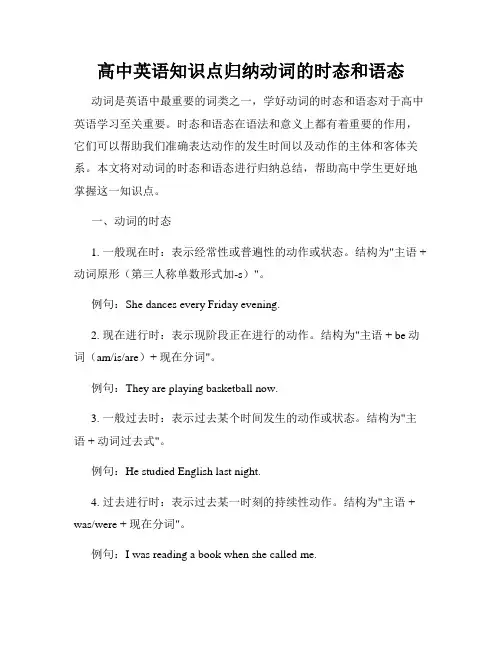
高中英语知识点归纳动词的时态和语态动词是英语中最重要的词类之一,学好动词的时态和语态对于高中英语学习至关重要。
时态和语态在语法和意义上都有着重要的作用,它们可以帮助我们准确表达动作的发生时间以及动作的主体和客体关系。
本文将对动词的时态和语态进行归纳总结,帮助高中学生更好地掌握这一知识点。
一、动词的时态1. 一般现在时:表示经常性或普遍性的动作或状态。
结构为"主语 + 动词原形(第三人称单数形式加-s)"。
例句:She dances every Friday evening.2. 现在进行时:表示现阶段正在进行的动作。
结构为"主语 + be动词(am/is/are)+ 现在分词"。
例句:They are playing basketball now.3. 一般过去时:表示过去某个时间发生的动作或状态。
结构为"主语 + 动词过去式"。
例句:He studied English last night.4. 过去进行时:表示过去某一时刻的持续性动作。
结构为"主语 + was/were + 现在分词"。
例句:I was reading a book when she called me.5. 现在完成时:表示从过去某一时刻开始一直延续到现在的动作或状态。
结构为"主语 + have/has + 过去分词"。
例句:She has travelled to many countries.6. 过去完成时:表示过去某一时刻之前完成的动作。
结构为"主语 + had + 过去分词"。
例句:They had already left when I arrived.7. 将来时:表示将来某个时间会发生的动作或状态。
结构为"主语 + will/shall + 动词原形"。
例句:I will call you tomorrow.8. 过去将来时:表示过去某个时间之后会发生的动作或状态。
高中英语:动词的时态和语态(一)专项讲解【基础回顾】考点归纳:高考考查的九种动词时态是:①一般现在时;②现在进行时;③现在完成时;④一般过去时;⑤过去进行时;⑥过去完成时;⑦一般将来时;⑧将来进行时;⑨过去将来时。
1. 动词时态的概念;2. 常考九种时态的基本用法,在真实的情景中恰当使用九种时态进行交际;3.区别容易混淆的时态的用法;4. 掌握和时态相搭配的时间状语。
【基础必读】一、一般现在时1.具体运用1)表示经常的或习惯性的动作,常与表示频率的时间状语连用。
时间状语:always,usually,every morning/night/evening/day/week/year,often,sometimes, occasionally,from time to time,twice a week,rarely,seldom,once amonth,hardly,ever,never.e.g. I leave home for school at 7:00 every morning.我每天早上7点左右离开家去学校。
2)表示主语具备的性格、能力、特征和状态。
e.g. I don't want so much.我不想要太多。
Ann Wang writes good English but doesn't speak well.王安英语写得很好但是说的不好。
比较:Now I put the sugar in the cup.现在我把一些糖放杯子里面。
I am doing my homework now.现在我正在写我的作业。
3)客观真理,客观存在,科学事实。
The earth moves around the sun.地球绕着太阳转。
Shanghai lies in the east of China.上海市在中国的东部。
4)在时间状语从句和条件状语从句中,常用一般现在时代替将来时。
高中英语语法:动词的时态与语态We have meals three times a day.我们一日吃三餐。
(现在的习惯)He is always ready to help others.他总是乐于助人。
(现在的状态)When I was a boy, I often went to play in that park.我小时候常去那个公园玩。
(过去的习惯)1.一般现在时(1)一般现在时的构成一般现在时主要用动词的原形表示,如果主语为第三人称单数,则一般在动词原形后加s或-一般现在时除了可以表示现在的经常性、习惯性动作或存在的状态外,还可表示:①客观真理、科学事实及自然现象。
此用法即使出现在过去语境中,也用一般现在时。
The sun rises in the east.太阳从东方升起。
②用于here, there开头的倒装句中,一般现在时表示现在正在发生的动作或存在的状态。
There goes the bell.铃响了。
Here comes the bus.公共汽车来了。
2.一般过去时(1)一般过去时的构成(2)一般过去时的用法一般过去时除了可以表示过去经常性、习惯性的动作或存在的状态外,还有以下用法:①want, hope, think, intend等动词的一般过去时往往表示“过去原……”之意。
I thought he was an honest man.我原以为他是个老实人。
He didn't intend to hurt you.他本来没打算伤害你。
②wonder的一般过去时有时也可表示现在的行为,但口气要比用一般现在时更加委婉、客气。
I wondered if you could do me a favour.我不知道你能否帮我一个忙。
③used to+动词原形,表示过去的习惯性动作而现在已经不再发生了。
We used to spend our vacation in the mountains.我们以前常常在山里度假。
第七讲:动词时态语态(一)11.I don’t think you’ve seen the film before, ___________?A.hav en’t youB. do youC. don’t youD. have you12.There came the No. 6 Bus just then, _____________?A.did thereB. didn’t thereC. didn’t itD. wasn’t there13.You needn’t hand in your exercise books today, _________?A.do youB. will youC. need youD. have you14.She ________ get up early tomorrow, does she?A.doesn’t need toB. needs toC. has toD. needn’t15.There used to be a small inn in the village, _________?A.weren’t thereB. wasn’t itC. usedn’t thereD. wasn’t there16.You’d better not ask such direct questions again, __________?A.hadn’t youB. had youC. would youD. wouldn’t you17.He said that he was late for work yesterday, __________?A.was heB. did heC. didn’t heD. wasn’t he18.Kate never dared to go out alone in the evening when young, _________?A.dared she notB. didn’t sheC. wouldn’t sheD. did she19.I don’t think he can carry that heavy box a lone, _________?A.do IB. don’t IC. can’t heD. can he20.You’d like to see my brother Bob, _________?A.hadn’t youB.would youC. don’t youD. wouldn’t you21. Nobody likes to be looked down upon, _______?A. doesn’t heB. do theyC. isn’t itD. don’t they22. You never fail until you stop trying, __________?A. don’t youB. do youC. isn’t itD. is it23. None is so sure, ______? A. is he B. isn’t he C. aren’t they D. can one24.One can never be too careful when crossing the street, ____?A. can heB. can theyC. can oneD. can she25.You and I could hardly work together, ___________?A.could youB. couldn’t IC. couldn’t we D . could we26. He must be helping the old man to water the flowers, _________?A.is heB. isn’t heC. must heD. mustn’t he27. _____him about this accident, will you?A. Not tellB. Don’t tellC. Not tellingD. Not to tell28.Sarah had her washing machine repaired the day before yesterday, _____ she?A. hadB. didC. hadn’tD. didn’t29. It doesn’t matter if they want to come to your party, ______?A. doesn’t itB. does itC. don’t theyD. do they30. I told them not everybody could run as fast as you did, __________?A. could heB. didn’t IC.didn’t you D . could they31.---He didn’t devote his time to his study, did he?----____. As a result, he failed al the final exams.A.Yes, he didB.No, he didn’tC. Yes, he didn’tD. No, he did32. There must have been a large number of tourists in Yuan Tujiao during the National Days, _____?A. mustn’t thereB. haven’t thereC. weren’t thereD. didn’t thereA.haven’t youB. mustn’t youC. needn’t youD. don’t you33. I don’t think what he said at the meeting makes any sense, _________?A. didn’t heB. does itC. did heD. doesn’t it34. We never dared to ask him a question, ________?A. did weB. didn’t weC. dare weD. daren’t we35. I don’t think he could have made so much money in the past few days,_____?A.did heB. could heC. do ID. has he三、完成下列反意问句1.. I don’t think that she can finish the work this week, _______?2. You always think that others misunderstand you, ________?3. I’m sure you would rather she went to school by bus, ______?4.. His novel must have been published ,________?5. His novel must have been published last month,______?6. You could have stayed with my uncle when you stayed in Shanghai, _______?7. He didn’t believe you were telling the truth, ________?8. They must have been playing computer games when you dropped in, ________?9. It was the first time he had failed in the test, _______?10. I don’t think he could have done such a stupid thing, ________?11. I don’t think he could have done such a stupid thing last night, ______?时态语态(一):一般现在时及一般过去时动词时态分为两大类:现在类和过去类现在类:一般现在时,现在进行时,一般将来时(进行/完成),现在完成时(进行时);过去类:一般过去时,过去进行时,过去将来时(进行/完成),过去完成时(进行时);1.一般现在时用法(do / does/ is ,am are; is/am/are done)(1)表示现在经常性、习惯性的、反复出现的动作或状态。
常与之连用的时间状语有:always, usually, seldom, in the morning, every day, on Sundays….(2)表示客观真理、科学事实、格言以及不受时间限制的客观存在The sun rises in the east and sets in the west.Light travels faster than sound.Water boils at 100 degrees centigrade.He told me that the earth moves around the sun.Failure is the mother of success.Where there is a will, there is a way.(3)表示按日程安排及时间表要发生的动作,后接将来时间状语。
The plane takes off at 8:00 . Don’t be late tomorrow.(4)在时间(when/ before/after/until/as soon as)、条件(if/unless/once/as long as/in case)、让步状语从句中(though/although/even if/even though/whether/no matter +疑问词),用一般现在时表示将来(有时用现在完成时也可)You will fail the exam unless you work hard. I’ll tell him the result as soon as I see him.Once you understand these rules, you’ll find the game easy.。